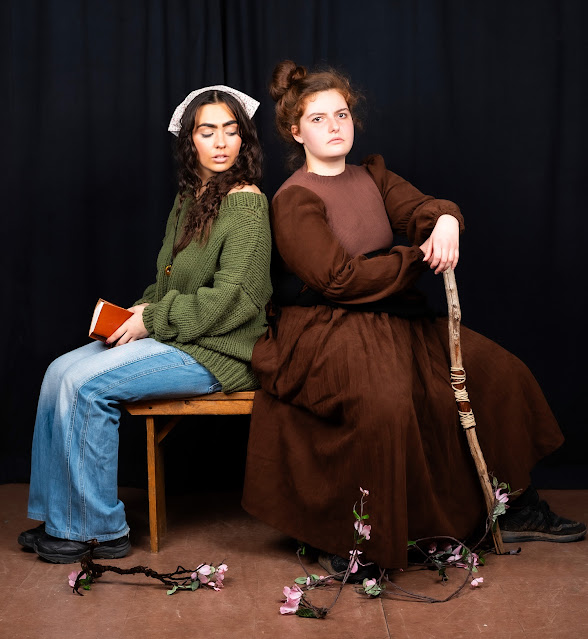Review: "Climate Fables: Debating Extinction" Offers a Vivid Fairy Tale for the End Times
Climate Fables: Debating Extinction
Written by Padraig Bond
Directed by Padraig Bond and Torch Ensemble
Presented by Torch Ensemble at UNDER St. Marks
94 St. Marks Place, Manhattan, NYC
April 3-17, 2024
 |
| Penelope Deen and Kristen Hoffman. Photo by Terrell Lopez |
A young woman named Susan (Penelope Deen) begins the play with promises and declarations of love to her unborn child. She is joined onstage by a pale woman dressed in brown, whom we later learn is Susan's mother, Miranda (Kristen Hoffman), wielding a staff and pronouncing incantations. Susan lives with her mother in what Miranda at one point describes as hiding, subsisting on, and in harmony with, the land and separated from the rest of a U.S. population radically reduced by floods, rising sea levels, volcanos, and more. Miranda quizzes Susan on past extinctions (reminding us that we either don't think or, worse, don't care, that, despite the Western conviction of eternal progress, mass extinction events are certainly not relegated to the distant past) and warns her that a storm is coming, which proves true both literally and otherwise.
 |
| Penelope Deen and Luis Feliciano. Photo by Terrell Lopez |
The show engages with questions of human nature and humanity's relationship with nature (although that phrase itself assumes a false binary)–the adaptability, curiosity, and resilience that Teddy praises alongside the proclivity for violence, exploitation, and narcissistic short-sightedness, linked to the question of whether the literally disastrous consequences of our actions could actually, at some future point, humble or change us in any meaningful way. Beyond, although not divorced from, such environmental concerns, Susan represents a woman trying to find her own voice and volition while caught between patriarchal attitudes on the one side and an overprotective mother on the other. Even an eco-witch like Miranda needs to let her child make her own way in the world eventually, however dangerous that world may be. The production richly evokes its future, complementing the images conjured by the dialogue with minimal props and effective use of sound, from the ambient noise of insects to the lashings of the storm when it arrives. The cast does great work, with Feliciano building on and undercutting our first impression of Teddy and Deen and Hoffman imparting nuance, depth, and intensity both to their characters and to the conflict between them. Audiences now have an additional chance to see Debating Extinction, which is more than humankind may get with the planet, so leave the debating to Teddy, Miranda, and Susan, and go see this surprising, absorbing, witchy, and wonderful fable.
-John R. Ziegler and Leah Richards
More from the 2024 New York City Fringe Festival:
News: FRIGID New York Announces Schedule of Performances for New York City Fringe Festival, April 3-21
Review: “Conversations with My Divorce Attorney,” or All My Little Words



Comments
Post a Comment